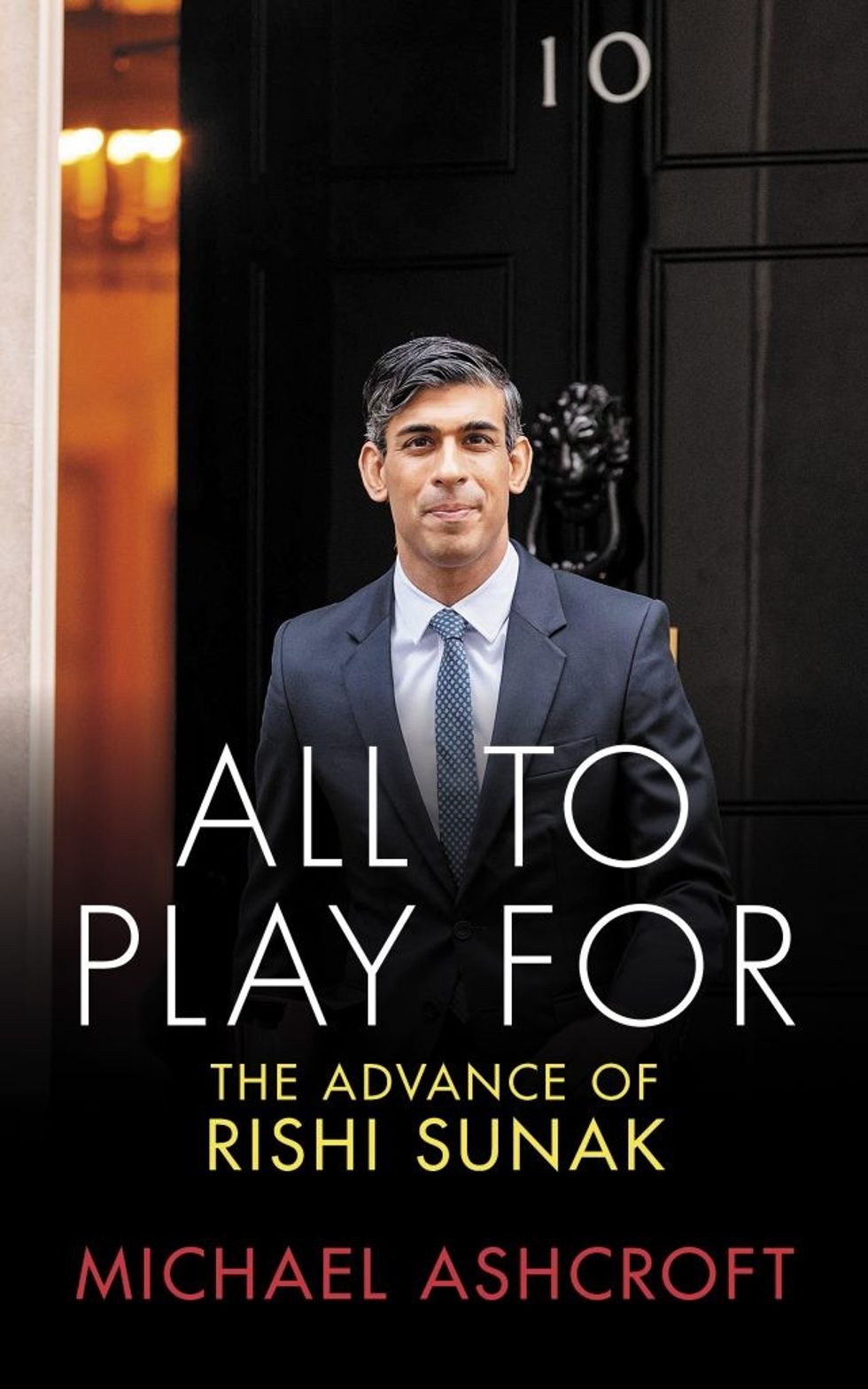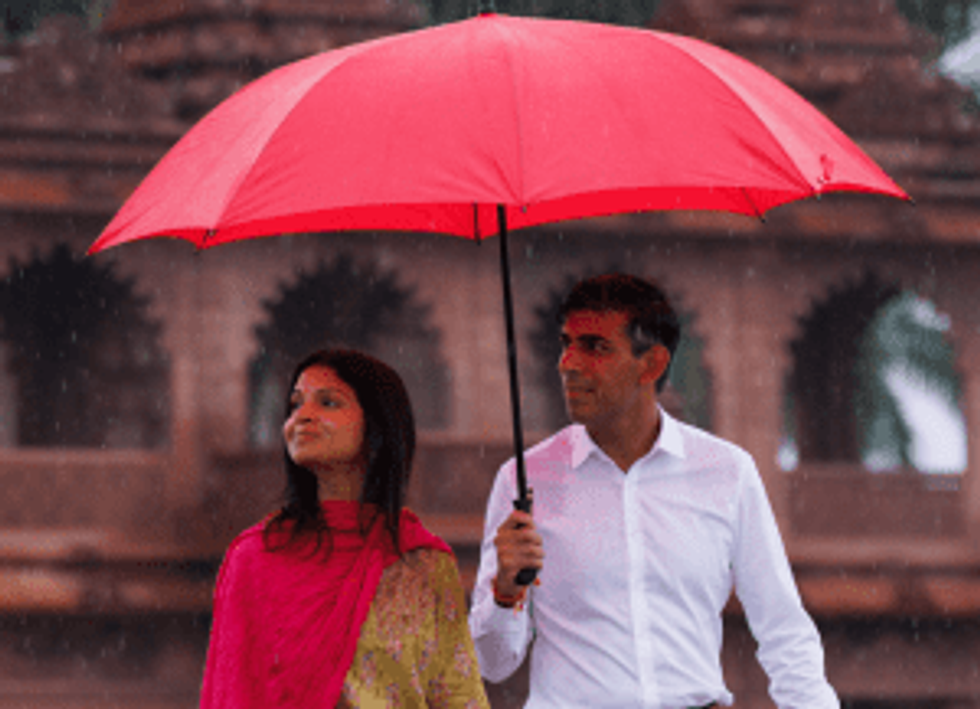LIZ TRUSS comes across as a “vengeful” character in Lord Michael Ashcroft’s new book, All To Play For: The Advance of Rishi Sunak, a sequel to his first biography, Going for Broke: The Rise of Rishi Sunak, which was published in 2020.
Last summer, Truss beat Sunak in the Tory leadership contest to enter 10, Downing Street, in succession to Boris Johnson, but had to resign within 44 days after crashing the economy.
During the contest, Sunak repeatedly warned her that unfunded tax cuts would prove disastrous – and his words proved prophetic.
Ashcroft, a former Conservative party deputy chairman, writes: “One Sunak associate says Truss made little attempt to disguise her personal dislike for him.”
His informant told him: “Rishi found relations with Liz very difficult during the leadership election. She was very frosty towards him and didn’t engage with him or talk to him much, if at all.
“Whereas it’s quite normal in politics if you’re running against somebody that you do have decent relations with them, she was very unfriendly, which was actually very short-sighted, as she didn’t even stop to think about the fact that they would, in any case, one day have to work together to win a general election. He found her very difficult on the campaign trail in that regard.”
The author adds: “Although rumours about Truss’s personal life were being swapped at the time, including one claim of an extramarital affair and another that a sex tape of her existed, Sunak told his team they were to have nothing to do with what he dismissed as grubby speculation.”
Truss and her supporters tried to paint Sunak as rich and out of touch. She kept attacking him over his private education at Winchester College. “So piercing were her words that Sunak apparently turned to her afterwards to ask, ‘Why are we doing this?’”
The author notes: “On July 13, the day of the first ballot, Truss received a major boost after two of Johnson’s staunchest allies, Jacob Rees-Mogg and Nadine Dorries, backed her. Speaking to broadcasters in Downing Street as they left a Cabinet meeting, they said they favoured Truss because of her low-tax Euroscepticism (despite the fact that she voted Remain at the 2016 referendum).
“Given that they were speaking with Johnson’s blessing, the clear implication was that Sunak was neither in favour of lower taxes nor sufficiently Eurosceptic. Allies of Sunak have described this episode as akin to a ‘drive-by shooting’ between rival gangs.
“A good example of how catty things became can be found in comments made by Nadine Dorries, who chose to criticise Sunak for wearing expensive clothes: ‘[Truss] will be travelling the country wearing her earrings which cost circa £4.50 from Claire Accessories. Meanwhile... Rishi visits Teeside [sic] in Prada shoes worth £450 and sported a £3,500 bespoke suit as he prepared for crunch leadership vote.’
“Whether sanctioned or not, Dorries’s observations certainly chimed with Truss’s own view that her route to victory would come by connecting with ‘ordinary’ Tory voters. As such, she portrayed herself as the plucky anti-Establishment candidate who favoured tax cuts, a role she slotted into easily.
“And yet, curiously for a leadership hopeful who accused her rival of being an Establishment man, it is clear that Truss was, arguably, the greater beneficiary of help from the Establishment.
“While Sunak managed to convince only one national newspaper – the Times – that he was the best-placed candidate to lead party and country, Truss, who had scraped onto the final ballot, was endorsed by the Daily Mail, Daily Telegraph and Daily Express.
“Her campaign was further bolstered by the fact that Boris Johnson invited her to a breakfast meeting in Downing Street on July 29 and to another meeting at Chequers a few weeks later, both times offering her advice on her campaign strategy.”
It had been assumed that as prime minister, Truss would include some Sunak backers in her cabinet. Ashcroft notes: “That assumption turned out to be wrong. Not a single Sunak supporter was invited to join Truss at the top table.
“‘One of the things that hadn’t been anticipated was that she would exclude all of Rishi’s supporters from the Cabinet and have this very narrowly based Cabinet, which turned out to be a disaster,’ comments a senior politician.
“‘This was one of the reasons her government blew up so quickly – she constructed a Cabinet from half the MPs, not all of them. So as soon as she was in trouble, she didn’t have that depth of support. It was very vengeful.’”
Kwasi Kwarteng, who was sacked as chancellor by Truss – the two are no longer the close friends they once were – remembers: “On the day I was sacked, Rishi called me. I thought that was a really nice touch. He’s very considerate. I like him. He’s a very good guy.”
Compared with Ashcroft’s first book, the author has dug up a great deal of detail in the sequel.
For example, although Sunak did not win a scholarship to Winchester (a school where previous pupils include the erstwhile ninth Nawab of Pataudi, Mansur Ali Khan, and his son, the Bollywood actor Saif Ali Khan), he attended as a day boy and was “Sen. Co. Prae” (meaning head boy) for a term.
For his A-levels, Sunak chose English literature, economics and maths. He also took AS-levels in biology and French. His parents were not entirely convinced by this selection. But “economics quickly became his favourite class. He has described it as ‘absolutely my major academic love’.”

Eastern Eye readers will be entertained by the disclosure that the prime minister “is something of a natural at ballroom dancing... This secret skill is a throwback to his time at Oxford University”.
As for what happens next, Ashcroft says: “The respected political scientist Sir John Curtice extrapolated that if the 2023 local election results were replicated at a general election, there would be a hung parliament in which Labour held 312 seats, well short of the 326 needed. This interpretation must give Sunak a glimmer of hope that all is not lost and, indeed, that there is everything to play for.
“Some political observers think it remarkable that even though the Tories have been in power for 13 years, [Sir Keir] Starmer did not do better.”
Ashcroft conducted polling “to find out what, if anything, had really changed in the seven months since Sunak became prime minister. Nationally, the Conservatives’ poll rating had recovered from the low 20s at the end of the brief Truss era to around 30 per cent – that is, from catastrophic to merely very bad indeed.”
The author concludes: “Politics is, and always has been, an unforgiving business. You only have to remember that Winston Churchill won the Second World War in 1945, but lost the general election by a landslide two months later, to know that.
“In this instance, Sunak may be more impressive than Sir Keir Starmer in certain respects. He may, therefore, deserve on paper to win his own mandate outright so that he can shrug off the problems of the past and refashion Britain as he sees fit.
“First, however, he needs to convince voters that the Conservative party is worthy of the prize of a fifth successive term in office. This is an achievement that no leader has ever managed before.
“Despite Sunak’s obvious personal qualities, he should not be surprised if the cards do not fall exactly as he hopes when the results of the next general election are declared.”
All To Play For: The advance of Rishi Sunak by Lord Michael Ashcroft is published by Biteback
Publishing, £16.99




















